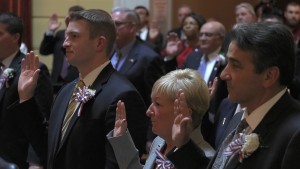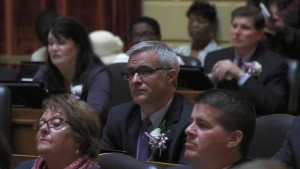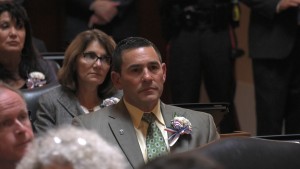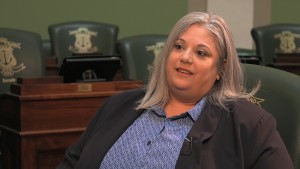 The first day of a General Assembly session is much like the start of baseball’s spring training. The veterans catch up with each other about how their off-season went and welcome new players who are still getting the lay of the land.
The first day of a General Assembly session is much like the start of baseball’s spring training. The veterans catch up with each other about how their off-season went and welcome new players who are still getting the lay of the land.
On January 3, 16 new lawmakers were sworn into The Rhode Island General Assembly — four in the Senate and 12 in the House. They come from all walks of life and various political philosophies.
The Hummel Report sat down recently with four of the freshmen to get a sense of why they ran and the issues that are important to them. They include Representatives Julie Casimiro of North Kingstown, Jason Knight of Barrington and Robert Quattrochi of Scituate, and Senator Jeanine Calkin of Warwick.
The new legislators arrive after a bumpy political year in 2016 that saw House Finance Chairman Raymond Gallison resign under the cloud of a federal investigation and another top member of House Speaker Nicholas Mattiello’s leadership team embroiled in a residency scandal.
Julie Casimiro: I think now that there’s been a few bumps in the road, everybody knows the public is watching so I think it’s going to be different.
Representative Casimiro, a Democrat, lost a close race two years ago to Republican Doreen Costa. Costa decided in June not to run for a fourth term and Casimiro, who worked in the corporate world for 35 years before taking several jobs in the social services sector, won easily in November against a Republican opponent from Exeter.
Jim Hummel (Motif): What did you hear when you were out on the campaign trail?
Casimiro: Believe it or not, I did not hear anything about truck tolls. That came up maybe twice.
Hummel: Did that surprise you?
Casimiro: Yes. I heard a lot about the legislative grants and the issues around that. People just wanted to know where I stood on things.
 Jason Knight: I think there’s huge potential in Rhode Island because it’s small, it can be nimble, it can be quick and I think a lot of that potential has been wasted over the years. It burns me up. I know that we can do better.
Jason Knight: I think there’s huge potential in Rhode Island because it’s small, it can be nimble, it can be quick and I think a lot of that potential has been wasted over the years. It burns me up. I know that we can do better.
Representative Knight is an attorney from Barrington who defeated 10–term incumbent and fellow Democrat Jan Malik in a primary, then cruised to victory in the general election. Knight said gun-control motivated him to run — and Malik had taken contributions from the NRA — but it goes far beyond that one issue.
Knight: I want to see Rhode Island thrive and succeed and I think that requires effort on a number of fronts. I think building a successful state is like tending to a garden; it’s not just air and it’s not sunlight or water or soil, it’s all of them put together. It’s good economic policy, it’s good criminal justice policy, it’s policies that support the middle class and try to expand the middle class. It’s education, for sure, and it’s competing with the other New England states to get our share of the economic pie that’s available.
 Robert Quattrocchi: Basically I got fed up to a point where I wanted to become involved.
Robert Quattrocchi: Basically I got fed up to a point where I wanted to become involved.
Representative Quattrocchi, a small business owner from Scituate, ran an unsuccessful race in 2014 against Democrat Representative Michael Marcello, who had served three terms. Quattrocchi, who ran two years ago as an independent, became a Republican this year and edged out Marcello in November.
He says he first started coming to the State House, upset by the failed 38 Studios deal, and more recently has been disturbed by the Raimondo administration’s handling of the botched UHIP social services computer rollout.
Quattrocchi: You see, I come from a faraway land and it’s called the real world. You know, I’ve been self-employed most of my life, I’ve always had to work hard to get ahead. It’s a faraway place from the glass walls and bubble of government and politics. Where I come from, people get fired for incompetence or certainly wasting money. These are the things that need to happen. There needs to be accountability for this.
 Jeanine Calkin: Some people asked me to run and I took it really seriously and considered it. I only did it because I thought I could make a difference.
Jeanine Calkin: Some people asked me to run and I took it really seriously and considered it. I only did it because I thought I could make a difference.
Jeanine Calkin, who has an IT background, was an organizer for Senator Bernie Sanders’ presidential campaign in Rhode Island. What she heard walking door-to-door in her Warwick District prompted her to challenge Democrat William Walaska, who had been in the state Senate since 1994. Calkin won a tight race.
Calkin: We didn’t necessarily know what we were up against. We just said we’re going to work as hard as we possibly can and get our message out there. And meet as many people as we could. And that’s where we went. We focused on the issues.
Casimiro: I think legislative grants need to be vetted properly. Because there are some great organizations out there doing great work who really need the money. I think they should be vetted better.
Hummel: Put them in the budget process?
Casimiro: That could do it.
Knight: People were frustrated with this building and they had the sense that this building was disconnected from the real problems that Rhode Island faces in some respect, that there were certainly some people who thought everyone who comes up here is coming up to play the game, to try and rub a few shoulders, rub a few elbows and get something out of it for them. People found out I was a lawyer and lawyers have a bad reputation up here and they said, “Are you going up there to do the right thing or get a job after you’re done?”
Hummel: Or enhance your practice.
Knight: Or enhance my practice. And I spent a lot of time saying, “This is my community service project. I’m going up because I love Rhode Island and I love what we have here and I want to try and make it better and that’s it.”
Quattrocchi: A lot of people are talking about split families, sending kids off to other states for jobs and such. I have a 23-year-old and I deal with the same thing.
Hummel: Trying to get a job here.
Quattrocchi: She’s in school now, but I advise her that maybe she may have to go elsewhere to find a job.
Calkin is committed to working toward a significantly higher minimum wage for Rhode Islanders, something that may be a tough sell with the leadership.
Calkin: I’d love to see a living wage. Right now we have $9.60 minimum wage, but that’s very difficult. One of the things that really struck a lot of people I talked to was how they’re struggling every day trying to make a life for themselves, or they have kids that out of college that have a huge amount of debt but they can only get lower-paying jobs, so I’d love to see a $15 minimum wage.
Hummel: You’ve heard the alternate argument that that could potentially hurt small business. What do you say to that?
Calkin: I disagree. I think if you give people at the lowest incomes more money to spend, they put it right back into local business.
Hummel: Did anything surprise you at orientation?
Casimiro: Yes. When we were walked through the legislative process in a perfect world, and we all know the perfect world doesn’t exist, so when we walked through the legislative process I was like, “Wow, it’s a big process.” It’s cumbersome even in a perfect world. So I’m hoping I can get my arms around that rather quickly, so I can be effective up here.
Several talked about walking into their respective chambers for the first time after the election.
Quattrocchi: I was in awe. A few times I looked around just to take it in so that moment didn’t pass me by. It’s a beautiful place — look at this — it’s historic and I’m part of it now.
Hummel: When you walked in for that first time, what did you think?
Calkin: It’s a little overwhelming in that I have this humongous opportunity and this chance to make a difference, which is amazing, and I’m very honored and very lucky to be able to do that.
And they are all committed to making a difference in whatever way they can — even as freshmen lawmakers.
Knight: I got a lot of, “Why in the God’s name would go up there and want to do this job?” And my answer always was, “Are we just going to give up, throw up our hands and say it doesn’t work?” It’s too easier to just say, “Uh, it doesn’t work, it’ll never change.” I told my kids, “I can’t complain about it if I’m not going to do something about it.”
The Hummel Report is a 501 3C non-profit organization that relies, in part, on your donations. If you have a story idea or want make a donation go to www.HummelReport.org, where you can also see the video version of this story. You can mail Jim directly at Jim@HummelReport.org.

